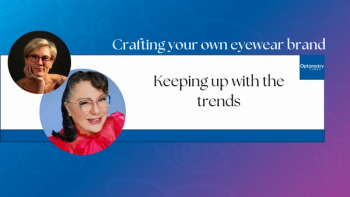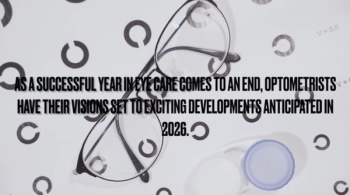
Q&A: Konrad Billetz, Cofounder, CEO, Frameri
I actually was going to go to med school. I had interviewed, taken the MCAT, then decided not to go to med school. It wasn’t the right place for me at that time. I always like business a lot. I wanted to learn sales, so I actually went into door-to-door sales-I made that obvious move from biochemistry to door-to-door sales.
Where did you grow up and how did you wind up getting shot in the eye with a BB?
I grew up in the mountains of north Idaho in the city of Coeur d'Alene/Post Falls area. I grew up building forts and playing out in the woods and the fields. Me and my buddy were playing around one day, just goofing around and building a fort, and guess we decided to get into a gun fight and [laughs] I was on the losing end of it. I was 11, and it was on Mother’s Day. So my poor mom, we had to go to the ER on Mother’s Day. Always fun times in the Billetz household.
Why did you leave academia and research to go into eye wear?
I actually was going to go to med school. I had interviewed, taken the MCAT, then decided not to go to med school. It wasn’t the right place for me at that time. I always like business a lot. I wanted to learn sales, so I actually went into door-to-door sales-I made that obvious move from biochemistry to door-to-door sales. [Laughs] So, I was in door-to-door sales for about three years and then I was accepted into business school in Notre Dame. I went out to South Bend and spent two years there. I went out there knowing I wanted to start something, I didn’t know exactly what it was, yet. I had my laundry list of ideas, and one of them was in eyewear. I spent a year and a half just researching the industry and the market, then I decided that was the place where I wanted to spend my time. The beauty of eyewear for me is like the combination of art and science. On the frame side you have all of the art, and on the lens side, the optic side, you have all of the science.
Related:
What were the obstacles that prevented mixing frames and lenses in the past?
I honestly don’t know the reason it’s not been done before other than from a precision standpoint, it is difficult to do. I think just the engineering standpoint was difficult. Up until recently, eyewear wasn’t viewed as the fashion accessory that it is now with eight out of 10 people viewing it as a fashion accessory. When I grew up, they were not for fashion. They were a medical device. Sunwear has always been more fashion oriented, but the social acceptance of being a fashion accessory as of recently has been much more powerful. People can be scared of change sometimes, especially if what you’re doing is working. Why would you change it?
Where did your confidence to just knock on doors come from?
I think you start with none. And then as you start to get better at it and you start to train more, that’s where it comes from. The harder you work, that’s where your confidence comes from. What you learn most from that is just how much of a mental game it really is because you’re going to get “no” all the time. So, more than anything, it prepared me to get told “no” all the time [laughs], overcome that, and keep your head up. You know, I just love meeting new people, so for three years I was just meeting new people every day. And meeting them in such an environment that can be very welcoming or extremely hostile, and you never know what you’re going to get. So, I think that helped me in the business world in general.
Check out Konrad's blog:
Having appeared on ABC’s Shark Tank, what’s the secret of the pitch for trying to get an optical product off the ground?
For us I think it was, “We’re the only ones doing something different in this field right now.” That’s the story that we like to stress. And not only that, customers love it. And they’re buying more of it. So, they’re buying more frames, they’re buying more lenses, they’re more loyal. I think all these things really come together to tell that story well, and it’s also coming from the fact that it’s something different in a field everybody knows is ripe for disruption. People know that even the smallest change can make such a big impact in this industry. And now it’s growing like crazy-I think the last report I saw was in 2020 a $120 billion worldwide, maybe even more than that, that’s a huge industry. You don’t have to do very much or change very much to make a huge impact.
What are the three biggest things you’ve learned about eyewear customers?
They want to try it on in person. So, everybody who is worried about online buying, don’t be. [Laughs] It’s really hard. It’s extremely, extremely hard. They want to try it on in person, they want options. People really like colors and selection. Unfortunately, a lot of online companies are really commoditizing the lens. What we’re learning about customers is that they’re not putting as much importance as they should onto the lens. But when you put them in a great lens, they see the difference. When you’re buying things online or you’re not getting the proper help that you should, you’re probably not going to be in the best lens that’s for you. So I think that’s the other thing that customers still need education on that…I think what customers need right now, especially our generation, those bummer millennials that we are, they want that transparency. They want to know what’s going on. Why is this better? Where are these cots coming from? So I think that idea of radical transparency is very important and that’s something we’re really trying to preach and we always try to be apart of with very fair pricing.
What’s something your colleagues don’t know about you?
I think they know everything about me at this point. [Laughs] We spend all of our time together. I can’t think of anything they wouldn’t know that wouldn’t have already come out. Like I said, going back to the transparency thing, like I’m an open book. So, I haven’t anything to hide. [Laughs]
What did you see in EnChroma’s product that interested you in creating a partnership?
First of all, it’s just an amazing technology. For us, it’s all about changing the eyewear experience, making eye wear better. We saw that as a logical step for us. For them, it’s all about giving more control to customers and giving them the freedom to change. So, using our model and system, we’re finding that people are able to purchase more lenses, which is obviously better for them. Anytime we can find new technologies in lenses or in frames and find a way that we can partner, it’s more fun to do it that way. It builds our business, it gets our name out there, and it shows what’s important to us-innovation in eyewear.
Frameri’s website says, “Handmade in Italy, designed in Over-the-Rhine, Cincinnati.” Why Cincinnati?
I initially was drawn to Cincinnati for few reasons. We were accepted to an amazing tech accelerator program in Cincinnati, the Brandery, and at the time it was one of the top 10 tech accelerators, but it focuses on consumer brands. Cincinnati is also home to one of the top design schools in the country that teaches eyewear design, University of Cincinnati College of Design, Architecture, Art, and Planning. Ohio is a big state for eyewear-right up the street from us is a little company most people know called Luxottica. [Laughs] Its U.S. company headquarters is located in Cincinnati. So, there’s a lot of eyewear knowledge and talent in that area.
What technologies do you think may revolutionize how consumers purchase eyewear?
You know, I think there’s a lot; whether they make it into the industry is another thing, right? [Laughs] I think what Opternative has done is great. There is a difference between refraction and eye exam-you lose out on the important diagnostic things you can get from a full eye exam. The pushback comes from making that distinction. I think tools like that are going to be interesting. Obviously Google Glass was a huge flop, but I think some technologies associated with it that would be great for the eyewear industry. One thing that I hope that stays is glasses, right? [Laughs]
What’s the craziest thing you’ve ever done?
Honestly, I would say just moving across the country. I know it sounds so basic. Putting it all on the line and not knowing what tomorrow’s going to hold. That’s pretty scary. I mean, you get to start over anew. That and you have to start up a company there, so you have to network and find future employees and do all of that, and it’s like, WOW. You’re figuring out eyewear design, you’re figuring out how you’re going to fund your company, you’re figuring out how you’re going to promote it, how to get people to buy it. What the heck are lenses? You’re figuring out all this stuff. [Laughs] Shark Tank was super scary. They edit it, they rearrange things. You’re putting yourself out there, and you just hope that they put you in the best light. I remember just sitting in there, getting ready to walk out, just being like, “What am I dong right now? This is terrifying. This is going to be seen by tens of millions of people all over the world. This is very terrifying.”
Newsletter
Want more insights like this? Subscribe to Optometry Times and get clinical pearls and practice tips delivered straight to your inbox.













































.png)


